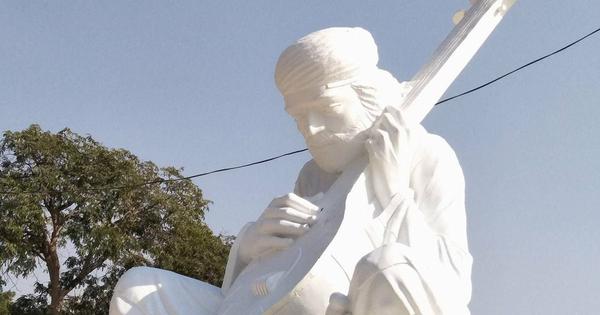
Do not hang back, it is
sunset, go boldly on. The sun is in your face, but do not hesitate. If you go as the
sun reddens, you will come to where the beloved
is with his company.
The sun sets after a delay; she has seen the rocks.
Sasui’s provision consists of pain, says Shah. With
head held high, the poor girl slain by grief enters
the Vankar.
“As I sat, the sun went down over the mountain
passes. How will I track him, when my path lies
over stones? My connection is with sorrows, my
friends.
No one should go with me, friends, a wilderness lies
ahead. There is no water, the journey is long, in
front of me are nothing but sand and wasteland.
Maybe one of you might curse the beloved as they
were dying of thirst.
On the open ground he has left no tracks, he did not
wait nearby. He finally went, leaving his tracks as
tokens that he had kept faith with me.”
Did you hear the sweet sound of his voice, or did you
lift your hands in vain? Hundreds and thousands
of Sasuis roam in search of their Hôt beloveds. No
child of the Baloch has ever learned pity.
It is partly that the earth is hot, mother, partly that she
blazes for her beloved. She presses on and yearns
for him, caught between both fires.
“The bonfire of the Baloch blazes over my head. You
taunt me because you do not understand the truth
of my condition. Come near me, mother, so that I
may give you an idea of my suffering.
See how the tears rain like water from the eyes in my
head. What I thought was love was really
flames from the fire.
If my soul forgets my beloved, it would be a good
thing if I were smitten by the hot wind and died
like the desert lark.
Do not card a cotton ball for me, mother. Kick the
spinning wheel and throw the
rolls of yarn in the water. The mountain dweller for whom I spun has
gone to Kech.
Curses on the Harho, on the Hôt, and on love. Mother,
all that I have got from seeing him is death.
Curses on their language, on the Baloch, and on the
whole tribe of camel men. He told me to search,
then he went into the rocks.”
The hotter the day becomes, the faster she presses on
with her journey. The Brahman girl’s love for the
Baloch began in pre-eternity.
So long as you live, keep burning, there is no
alternative to burning. Go on through heat and
cold, there is no time to sit and rest.
Press on through heat and cold, there is no time to sit
and rest. Otherwise darkness may fall and you will
not find the beloved’s track.
“As I roamed, I thought of the Baloch. I decided that
I will leave Bhambhor, where my heart finds no
peace.
The delights of Bhambhor separated me from his
group. With much suffering I will now search the
mountains for him.
Sisters, flee Bhambhor and be saved. Many friends
have already brought suffering on themselves
in this place.
Sisters, the smoke of hell arises from this Bhambhor.
Find a guide and go forth in good time, Sasui.
Friends, I think the wilderness is better than
Bhambhor. Otherwise my pain would not have led
me to search the mountains.
Friends, I think Bhambhor is better than the
wilderness. It was there that my eyes saw the
peerless Ari.
The Bhambhor that did not go after the Hôt is
utterly lost. The city completely failed to recognise the
peerless Ari. Those who beheld him with their
hearts enjoyed the beautiful lord.
Bhambhor was bad, Ari made it glorious. The lord
of the Harho removed anxiety from the whole
world. The girls learned to print on cloth, making
Punhun their pattern. The peerless one came, the
one who adorned them with sorrows.
My beloved left early because he was ashamed of me.
It was in Bhambhor that he came to know about
my caste.
Sisters, if I had been related to the
tribe of Ari, the mountain men would certainly have called me
when they departed.
If I was their kinswoman, I should have complained
about my brothers-in-law. Out of respect I did not
say a word to them. Mother, my caste is a disgrace
to the people of Kech.
If I had spread my hair as a bed covering, your
companions would still have gone. Perhaps the
eyes of the Baloch noticed some fault in me.
Excerpted with permission from The Risalo of Shah Abdul Latif: Sufi Poetry from Sindh, Shah Abdul Latif, translated by Christopher Shackle, Murty Classical Library of India and Harvard University Press.
📰 Crime Today News is proudly sponsored by DRYFRUIT & CO – A Brand by eFabby Global LLC
Design & Developed by Yes Mom Hosting






